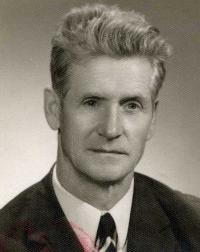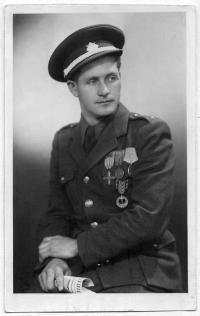"It was dangerous to start with. They didn't hurt Czechs, and in fact, Germans came visiting the village, looking to buy vodka, or butter or eggs. Because they... It was clear the army wasn't supplied with food very much, the German army. And especially during a feast day, when they were given leave to visit Germany, they drove around the Czech villages, looking to bring home some, well, food." "Obviously. But the Jewish population was worse off I guess?" "They shoved the Jews into a ghetto, into this poor quarter." "In Luck?" "In Luck." "And what was the quarter called?" "It didn't have a name. They called it 'Runduky'. Just a load of wooden huts, a square, right, and huts built into a triangle shape. Well, but in between them were brick houses, yes. There even used to be an apothecary's there and such, during the Polish governance." "And that was the worst quarter of the town, yes?" "Well, the poorest, the poorest." "But the Jews didn't live there before the war, did they, they lived there afterwards, when they were forced there?" "They... the poor lived there, in that quarter, but not in those huts, they only used those as shops. Like the Vietnamese have their stalls here, something similar. But they had them covered and enclosed by reason of the cold and the snow." "And did it mean anything, the name 'Runduky', or...?" "Well, it was... I don't know if it was a Jewish word or a Ukrainian one. Well, runduk meant 'hut', right." "Oh, right. And what happened to the Jews after that?" "The Jews, well until the fall of Stalingrad, the Jews just stayed there. They were put to forced labour, they each had a yellow circle over here, back and front." "What circle?" "A circle, like a yellow circle." "Not a star like it was here?" "They had a yellow circle. That meant they were a Jew. And they could pass through the town..." "And they had one on their backs too?" "On their backs on the left." "And they had something written on it or something?" "No, just a yellow circle. That was just a symbol, saying he was a Jew. And when he was walking through the town and a German met him and didn't like something about the Jew, he took his gun and and shot him through that circle. Without any... If he didn't like him, he shot him." "So they used that as a target?" "As a target." "Well and when Stalingrad fell, what changed?" "When Stalingrad fell, then, well, I don't know if it was Jews, Ukrainians, Germans, German deserters, they dug pits. Those pits were five metres wide and a hundred metres long. Four of them next to each other. Less than three kilometres from our place." "And where did they dig them?" "Polanka it was called. And then they started bringing the Jews there." "If it was three kilometres away, you had to see something occasionaly, no?" "Well, we heard the gunfire. No one dared to go there. They were at it night and day, and the Ukrainian militia, the youngsters, they all joined the German army. So some of them acted as police, some stood guard and some underwent soldier training at the barracks. And they helped bring in the Jews in trucks. The Jews had to hold their heads down, they didn't know where they were being taken. Whoever raised his head got butted. When they arrived at the pits, they had to strip naked, climb in, lie down, and they shot each of them in the head."


